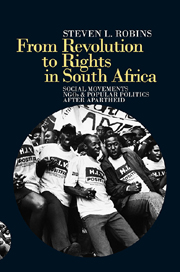 From Revolution to Rights in South Africa
From Revolution to Rights in South Africa AIDS Activism & Biomedical Citizenship in South Africa
Published online by Cambridge University Press: 05 April 2013
Introduction
It was not AIDS that was killing our loved ones, the dominant analysis went. It was witchcraft. Fingers were pointed at suspected neighbours.
(Thokozani Mtshali, Sunday Times, 28 April 2002)The biggest challenge for doctors in rural KZN is getting HIV-positive women to ask for treatment: A bitter pill to swallow.
(Mail & Guardian, 23 August 2002)This monograph discusses the vexed question of HIV/AIDS … It also accepts that the HIV/ AIDS thesis [is] informed by deeply entrenched and centuries-old white racist beliefs and concepts about Africans and black people … In our own country, the unstated assumption about everything to do with HIV/AIDS is that, as a so-called ‘pandemic’, HIV/AIDS is exclusively a problem manifested among the African people.
(Castro Hlongwane, March 2002)African children's faces have been paraded in the media in the name of giving a face to AIDS. I agree the disease must be given a face – but it should be human, not African … Parading African children in the media adds to the stigma already suffered by those infected and affected by HIV/AIDS.
(Phumzili Simelela, Mail & Guardian, 6 December 2002)This chapter focuses on how South African AIDS activists and government interpreted and responded to the AIDS pandemic. In South Africa responses to HIV/ AIDS have included forms of activism that, like the transnational housing activism case study in Chapter 4, could best be described as ‘globalisation from below’ (Appadurai 2001).
To save this book to your Kindle, first ensure no-reply@cambridge.org is added to your Approved Personal Document E-mail List under your Personal Document Settings on the Manage Your Content and Devices page of your Amazon account. Then enter the ‘name’ part of your Kindle email address below. Find out more about saving to your Kindle.
Note you can select to save to either the @free.kindle.com or @kindle.com variations. ‘@free.kindle.com’ emails are free but can only be saved to your device when it is connected to wi-fi. ‘@kindle.com’ emails can be delivered even when you are not connected to wi-fi, but note that service fees apply.
Find out more about the Kindle Personal Document Service.
To save content items to your account, please confirm that you agree to abide by our usage policies. If this is the first time you use this feature, you will be asked to authorise Cambridge Core to connect with your account. Find out more about saving content to Dropbox.
To save content items to your account, please confirm that you agree to abide by our usage policies. If this is the first time you use this feature, you will be asked to authorise Cambridge Core to connect with your account. Find out more about saving content to Google Drive.